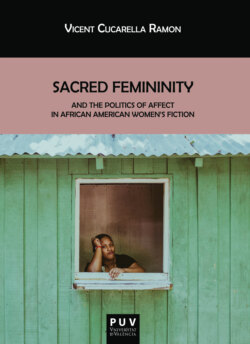Sacred Femininity and the politics of affect in African American women's fiction

Реклама. ООО «ЛитРес», ИНН: 7719571260.
Оглавление
Vicent Cucarella Ramón. Sacred Femininity and the politics of affect in African American women's fiction
Отрывок из книги
SACRED FEMININITY
AND THE POLITICS OF AFFECT
.....
In the context of the Sanctified Church in the 20th century, Moses, Man of the Mountain’s rhetorical complexity puts the black priestess center stage to bolster up a determinative theological and theoretical approach by conceiving a female protagonist as the leader of the black community. Though her leadership is openly challenged, Miriam, the priestess, unfolds a feminist reading of spirituality striving to unite the entire community. In so doing, Hurston cultivates a feminist vision of African American modes of spiritual perception that wield the rhetoric lament of the jeremiad to breed the politics of affect within the sacredness that unite black women on the whole. Miriam’s relevant role in the story brings the focus to the kaleidoscopic nature of spirituality that African American women have historically nurtured. Placing the figure of Moses in the middle of female sacred subjectivity aims to pave the way and show an example for black female leadership—and therefore public recognition—within the black community. Also, Moses, Man of the Mountain is Hurston’s literary rendition of the aesthetics of sacredness as a healing process considering the sociocultural view that her idiosyncrasy represented in the context of the Harlem Renaissance. However, Hurston is not content with portraying African American women’s spirituality as a simple source of good. Accordingly, through Miriam’s final surrender to the demons of power and religious tyranny, the author conveys and demands an ethical stand to the sacredness that black women need to cultivate. The novel’s final chaos and social turmoil help to elucidate Hurston’s message to include black female spiritual vindications in the reconfiguration of the nation within the aesthetics of black vernacular culture. So, besides contemplating religion as a source of social critique, in Moses, Man of the Mountain Hurston’s politics of recognition rely heavily on female affective bonds within the spiritual ethos of the nation.
Lastly, Chapter 4 explores the role of Christianity in the twenty-first century through the eyes of Toni Morrison. Her ninth novel, A Mercy (2008), offers the possibility to look back to the primordial settings of the Christian creed of the United States. In this light, Morrison links the religious misreadings and mischiefs when they come to represent and allure the egalitarian ethos of a nation that yearned for social perfection in the eyes of God. The transcultural visions of the female characters that fill the novel bring another focus to the concept of sacredness both in contemporary America as well as in the origins of the nation. Thus, A Mercy re-contextualizes the last stage that the American jeremiad beholds—“a resolving prophecy that society will shortly complete its mission and redeem the promise” (Howard-Pitney 8)—, and is complicit with the idea that black Christianity has contrarily held out a sense of an unresolved prophecy. However, affect does figure notably for Morrison seems to contend that the affective bonds suffuse the imaginary power of sacredness and reveal the Christian to be harmful when adopted by the enticing Patriarchal system—Jacob as the American Adam—and by the dispossessed female subjectivities, more precisely through the figure of Florens—expelled from this supposed paradise as the biblical Eve. Hence, in A Mercy, religion becomes an aesthetic outlet that the author uses to sharply despise its ethos with regards to its power to heal and give comfort. In so doing, the Nobel laureate grows apart from the path of considering spirituality as a redemptory tenet that Crafts and Hurston envisioned. The wrenching intimacies of women’s pain in the novel signal the pitfall of the sacred message and exemplify how in a globalized era in which religious discourse seems to be associated to uncertainty and inequality, spirituality functions not as a “life-affirming ideology” (146), as Judylyn S. Ryan declares, but rather as a contested commodity that can even thwart the subjectivity of African American women.
.....